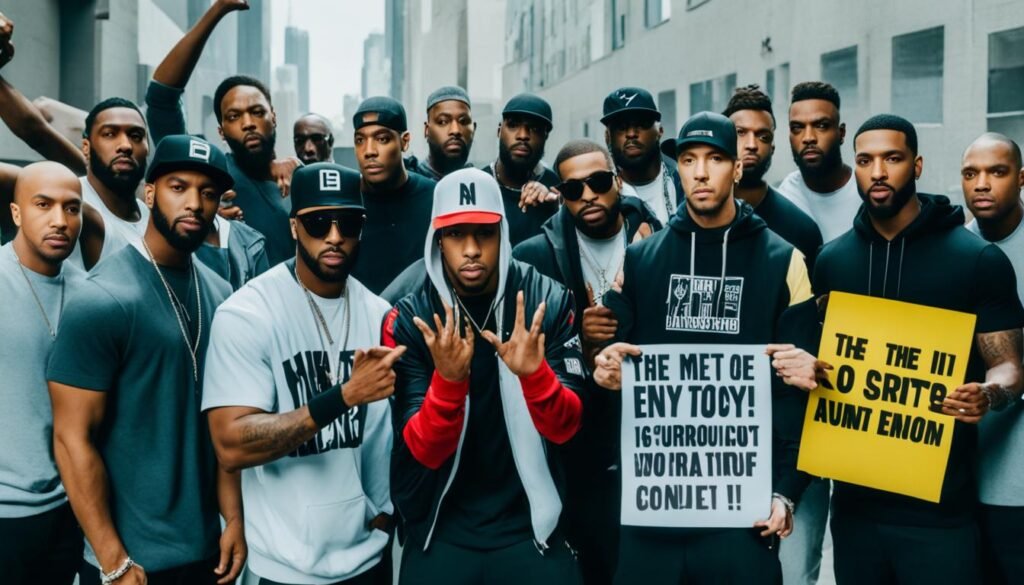Does Eminem Have the N-Word Pass?

As you navigate the intricate landscape of hip-hop, questions about racial sensitivity invariably surface. You’ve likely encountered the heated debates over the eminem n-word controversy. Eminem, a powerhouse in the rap game, came under fire for a historical tape that brought his usage of offensive language and potential eminem racial insensitivity into the spotlight. This revelation sparked widespread discourse about whether a non-Black artist like Eminem could ever be granted what some refer to as an “n-word pass” within the bounds of a genre that is deeply intertwined with Black culture and expression.
Caught in the crosshair of cultural appropriation and artistic freedom, your understanding of the issue hinges on the multilayered context of Eminem’s career and the hip-hop community’s response. It’s a conversation threaded with complexity—does Eminem, an artist with celebrated credentials, own the privilege to bypass the guidelines of racial epithets? Or does the eminem n-word controversy reveal a broader narrative about the intersections of race, music, and the evolution of social consciousness? As we delve into this topic, the nuances of eminem offensive language will unfold in a narrative as provocative as the genre itself.
Eminem’s Historical Use of Racial Epithets
When you think about Eminem, a myriad of titles might come to mind: Grammy award-winning artist, bold lyricist, or a figure of controversy that has woven himself into the complex tapestry of hip-hop culture. Yet, in spite of his massive success, the specter of **eminem racial controversy** looms due to his use of inflammatory language in the past. Delving into this topic, you might recall a particular moment that struck a chord in the public’s consciousness—the emergence of an old recording where Eminem used **eminem racial slurs** in a manner most derogatory.
It wasn’t just the language, but the fact that these words came from a tape recorded in his youth that caused a stir. The rapper himself acknowledged this as a display of teenage foolishness, a lapse in judgment during a moment of anger. Even though Eminem was not a newcomer to criticism—having already faced backlash for homophobic and misogynistic lyrics—this was the first time he faced an accusation of this nature.
Some argued whether the shadow cast by the tapes could engulf Eminem’s standing in the hip-hop industry. Was it possible that his remarkable success and connections, exemplified by his strong tie with Dr. Dre, would be enough to eclipse the harsh words once spoken? Eminem, known as a voice for the disenfranchised, found his credibility at the intersection of his past controversy and present influence in an art form deeply connected to the Black experience.
As you contemplate Eminem’s journey, and the **eminem racial language** that once turned heads, you can’t help but ponder over the evolution of dialogue in hip-hop. Eminem’s narrative is not just a tale of personal growth but a reflection of the industry’s progress in dealing with issues of racial sensitivity and redemption.

The Eminem N-Word Controversy
When you delve into the legacy of Eminem, one of hip-hop’s most acclaimed yet polarizing figures, you encounter a past tarnished by a youthful mistake that ignited a storm of eminem offensive language and eminem racial controversy. This retrospective look brings to light formidable challenges he faced, forcing the industry and fans alike to reexamine the principles of eminem racial sensitivity. Let’s explore the incident that shook the foundations of Eminem’s rapport with the hip-hop realm and the broader societal implications it carried.
Understanding the 1993 Tape Incident
The eminem n-word controversy can be traced back to an old tape from 1993 that surfaced, featuring Eminem uttering racial slurs—a reveal that stunned both the industry and his fanbase. Critics pointed fingers and ‘The Source’ magazine, a respected voice in the hip-hop community, took an explicitly harsh stance against the rapper. Eminem, in his defense, attributed the incident to the follies and frustration of his teenage years—expressing regret and distancing himself from these past actions.
The Impact on Eminem’s Reputation
It stands to reason that your reputation in the music world acts as the cornerstone of artistic credibility. For Eminem, the emergence of this tape raised questions about his character and the very core of his values. Despite the backlash, his career trajectory—a testament to his talent and fan support—continued its upward climb, marked by chart-topping albums and the nurturing of successful protégés. It seemed that both his die-hard fanbase and peers in the industry were willing to consider this episode an aberration rather than a definitive reflection of his identity.
Reaction from the Hip-Hop Community and Fans
The discourse ignited by the controversy spanned beyond Eminem’s personal sphere, entering the broader narrative about eminem racial slurs and eminem racial insensitivity within the genre. Influential figures, like Russell Simmons, chose to stand by Eminem, focusing on his transformative journey and philanthropic efforts, which resonated with many fans. Inside the community, the incident sparked deeper conversations about double standards, revealing the intricate dynamics and sensitivities that influence racial discourse and freedom of expression in hip-hop culture.
The Cultural Significance of the N-Word in Hip-Hop
When you dive deep into hip-hop, you come to understand that the n-word carries weight that reverberates through its history and present. It’s not just a word; it’s a marker of identity, community, and cultural dialogue that’s absolutely central to the genre. For Black artists, using the n-word can be a form of empowerment—a reclamation of language that’s been weaponized against them for centuries. This is why Eminem’s conscious decision to avoid the n-word speaks volumes about his understanding of its significance and the racial sensitivities it entails.
Usage Within the African-American Community
The African-American community has a unique relationship with the n-word, one that’s interwoven with nuance and contextual meaning that varies with intent and tone. Its usage within hip-hop often transforms the word from a slur into a symbol of camaraderie; it becomes a part of the in-group vernacular that denotes a shared experience and a reclaiming of power. This linguistic pivot isn’t lost on Eminem, whose own racial sensitivity has led him to tread carefully around language that carries such a potent symbolism.

Varied Reactions to White Artists Using the N-Word
When it comes to the n-word, the hip-hop community—and society at large—is sharply divided on whether white artists have any business using it. Eminem’s choice to steer clear of racial epithets in his music is a nod to the complexity surrounding this issue. This approach has not only helped him avoid controversies similar to those faced by other white artists but also demonstrates respect for the cultural boundaries that have been drawn by the very pioneers of the genre.
As you can see, the eminem n-word pass is more than just a titillating phrase to stir up debate; it’s tied to a larger conversation concerning eminem racial language, eminem racial epithets, and the cultural responsibility of artists navigating the waters of an art form rooted in Black struggle and expression. Eminem’s respect for these dynamics echoes through his work, underscoring a broader discourse on eminem racial controversy and the power dynamics at play in hip-hop.
Eminem’s Stance on Racial Sensitivity and Language
In the dynamic landscape of hip-hop, your favorite artists are not only known for their beats and rhymes but also for their cultural impact. Eminem’s position on racial sensitivity is a testament to his awareness within an industry deeply intertwined with the African-American experience. It is through his actions and his words that we see the reflection of an artist who understands the significance of language in shaping society.
Collaborations as a Measure of Acceptance
You’ve seen him on stage with legends like Dr. Dre and 50 Cent, partnerships that serve as more than just musical collaborations—they’re significant nods of recognition from key figures within the community. These alliances have not only bolstered Eminem’s authenticity in a genre where racial sensitivities can’t be ignored but also demonstrated his commitment to respecting and upholding the racial and cultural dynamics at play.
Public Statements and Disavowal of Offensive Language
Eminem doesn’t shy away from confronting his past. His public addresses and interviews serve as platforms where he’s openly disavowed the offensive language of his youth. It’s in this transparency that we find a narrative of personal growth and an acknowledgment of eminem racial insensitivity. This evolution is crucial, reflecting a path of maturity that sets the tone for conversations around eminem racial controversy and how the artist assumes responsibility for his influence.
Certainly, Eminem’s journey has been mired in debates over eminem offensive language, but it has also been a journey about learning and advocating for respect. As listeners and fans, you witness an artist’s evolution, and Eminem’s story is one where the measures of acceptance do not just rest on success but on demonstrating a progressive stance in a world where sensitivity towards racial issues remains paramount.
Conclusion
The ongoing debate over Eminem’s access to the “n-word pass” is a reflection of the depth of cultural and historical layers wrapped up in a single, potent term within the African-American lexicon. Eminem, navigating the treacherous waters of racial controversy, has effectively used his platform to showcase a level of racial sensitivity that aligns with the broader expectations of both the hip-hop community and his diverse listener base. Through deliberate choices in his collaborations and a clear avoidance of racially offensive language in his lyrics, Eminem has demonstrated awareness and respect for the complexities surrounding the n-word—a respect that seems to extend beyond performative gestures into the realm of genuine understanding.
While Eminem’s journey through music and controversy has been laden with incidents that spark dialogue about eminem offensive language and eminem racial insensitivity, his response to the backlash has been telling. His public statements reveal a growth trajectory, acknowledging past missteps and setting a precedent for accountability. It’s a tightrope walk between owning one’s artistry and honoring the cultural sanctity of the communities that helped shape the hip-hop genre. Eminem’s experience serves as a stark reminder of the tension between creative freedom and the responsibilities that come with a platform of influence, especially in a world grappling with the nuances of eminem racial controversy.
Ultimately, the question of eminem n-word pass cannot be answered without acknowledging the societal shift towards heightened consciousness about the power dynamics of racial nomenclature. Eminem’s stance is perhaps less about possessing a hypothetical “pass” and more about understanding and respecting an unwritten social contract—one that demands empathy and thoughtful engagement with the words we use and the histories they carry. As music continues to evolve as a medium of expression and social commentary, Eminem’s narrative will likely remain a reference point in the ongoing discourse about race, respect, and the right to artistic expression within our cultural mosaic.
FAQ
Does Eminem have the n-word pass?
The term “n-word pass” is considered highly problematic and is not an official or widely accepted concept. Eminem faced backlash for his use of racial slurs in the past, but he does not use the n-word in his current music. The idea of a pass for using such language is controversial and has not been granted or recognized as legitimate by the African-American community or hip-hop culture at large.
What was the Eminem n-word controversy about?
Eminem’s n-word controversy stems from a leaked tape dating back to 1993, where he used racial slurs, including the n-word. The controversy brought his reputation into question, and he faced criticism from parts of the hip-hop community and the general public. Eminem later apologized, attributing the language to anger and frustration from his teenage years, and has since avoided using racially insensitive language in his music.
How did the hip-hop community react to Eminem’s historical use of racial epithets?
The reaction from the hip-hop community was mixed. Some were disappointed and critical of Eminem’s use of racial slurs, while others, including prominent figures like Dr. Dre and Russell Simmons, continued to support him. They pointed to his growth as an artist and his positive contributions to the genre and society.
What is the cultural significance of the n-word in hip-hop?
Within the African-American community and hip-hop culture, the n-word has complex meanings. It can signify camaraderie and solidarity or be used subversively as part of in-group vernacular. However, when non-Black artists attempt to use the term, it can evoke strong reactions due to the word’s historical and racial implications. Eminem’s conscious decision not to use the n-word in his lyrics indicates his respect for its significance and sensitivity within the community.
How have Eminem’s collaborations reflected his understanding of racial issues?
Eminem’s collaborations with prominent Black artists in the industry, such as Dr. Dre and 50 Cent, have been seen as significant endorsements, indicating his acceptance within the hip-hop community. His respectful approach to collaborations and avoidance of using racially insensitive language suggest an awareness of and sensitivity to racial issues.
Has Eminem made public statements regarding his racial sensitivity and use of language?
Yes, Eminem has publicly acknowledged his past mistakes with respect to the use of racially insensitive language and has expressed his commitment to racial sensitivity. He has stated that his past use of racial slurs was a result of anger and ignorance in his teen years, and he has distanced himself from such language in his personal and artistic evolution.




Leave a Comment